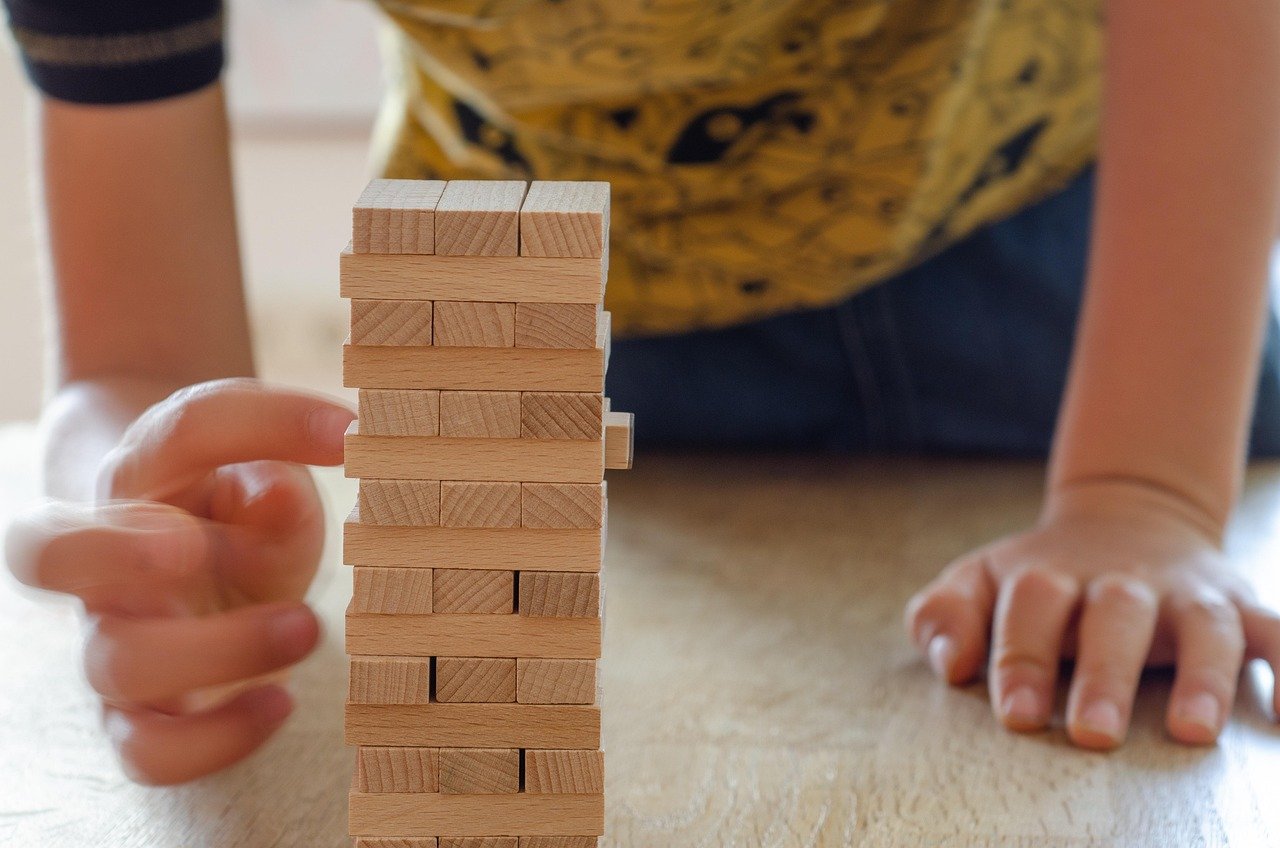
Written by Laura Elliott Adams, M.S., CCC-SLP
I once had a new client where the parent transferred to us saying that she left the previous clinic because she didn’t feel comfortable paying for a session where all they did was play Candyland. I wasn’t there, so I can’t speak at all as to what the parent experienced. My guess, though, is that it could have been a miscommunication as to how incredibly valuable game play can be.
I’m talking about the type of face-to-face game where you…..well…..communicate!
Games allow us to practice almost every aspect of communication:
1) Turn-taking and Social Language
For our younger children, we use all kinds of Social Stories that help teach the basic frameworks of game play and how to be a good sport. Who gets to go first? It’s ok if you don’t win because the main focus was actually having fun together (or if winning/losing is challenging, cooperative games are a brilliant starting point!). What does it mean to be fair? What if the group is playing by a slightly different set of rules, how do we all negotiate that? What does “sorry” really mean in the game “Sorry!” and how do you communicate that so everyone is still laughing at the end? How is it that everyone voted for the silly answer in “Apples to Apples” and not the “obvious” answer? Master that, and you’ve got a social skill that will take you places!
2) Joint Attention and Perspective Taking
I love card games where you don’t want to show the other players your cards. Kids tend to learn the power of eye-gaze pretty quickly with a classic game of Go Fish! I love to give hints just using my eyes in the “I Spy Eagle Eye” game. Many games have us quickly use pronoun referents that are defined nonverbally with a point, look, or chin nod… put your piece here, there, anywhere…. these go over there with those. Which ones? These… see where I’m pointing? Oh, I didn’t see that we weren’t looking at the same thing. It’s nothing that a quick conversational repair can’t fix!
3) Words, Words and More Words
There are countless of word-based games out there that encourage phonemic awareness, receptive language and expressive language development. Talk about vocabulary building!! That they’re fun… well, that’s a bonus! It’s a therapy win-win as far as I’m concerned. When we’re having fun, those concepts are far more likely to stick. I tend to modify almost any game to meet the specific goal needs of my clients. I’ll customize card decks to address therapy targets even adding my own cards. I always linger a little longer to laugh at the linguistics (lol). I typically throw out the timer to give clients a non- stressful route to learning how to experience the fun in language.
4) Procedure Format
What better way to learn how to answer a “How” question than telling someone how to play a game? I always save the printed rules to use in therapy (even older kids learn language by identifying all those imperative verbs!) I often have kids pull out the rules, read them, then teach me how to play the game. They don’t even realize they are doing such a difficult, high-level language task!
5) Speech Articulation
It almost goes without saying that we can modify any game to work on phoneme specific targets. There is always the motivating classic– do a therapy card task then take a turn. At the more spontaneous level, there are so many games that have speech repetitions virtually built into them. “My turn/your turn” is a favorite for moving into structured conversational phrases for “r” as is “go fish” for “g,” “f,” and “sh.” Take your pick! Ravensburger’s “Rivers, Roads, and Rails”… you can’t beat that “r” alliteration!
6) Memory and Following Directions
I have the fondest memories of playing “Concentration” with my mother. She seemed to have a magic power because she knew where all the cards were. I wanted to do the same! Memory pair games don’t have to be identical matching. The possibilities are endless where the question is on one card and the answer pair is on the other card: definitions, synonyms and antonyms, multiple meaning words, describe what picture you see and how they’re the same or different. And then there are the games you throw your whole body into… following directions are verb-based, after all! We put. We draw. We follow. We take. We go. We get. We give. We show. We share. We laugh. Ask any OT. Movement is inherent to the entire task of following directions! How many of us learned our left from our right in playing “Twister?” Try to learn that in a worksheet task!
7) Sequencing Vocabulary
Games are all about sequencing an experience from start to finish. How do we begin? Who goes first? Wait! I go after you. Before you move, you have to pick a card. Last time, we played it this way. The next time, can we try it this way? While you wait for your turn, you can watch where the other players have moved. (Finally, a strategy that’s worth the wait!) How do we end? Let’s play again!
“What can we do at home to help?” You know my answer. Your homework is to play a game! Here is a list of some of our favorites for a variety of language targets.
Recommended Board and Card Games
Look for Kids/Junior editions to match language level. Also note that older versions of the games may have a few items that are for more mature audiences. We suggest pre-screening cards/questions beforehand and omitting any you feel may not work.
Speech Articulation/Apraxia
Ravensburger Rivers Roads and Rails /r/
Hiss
Taco Cat Goat Cheese Pizza
Go Fish
Old Maid
Cranium Cariboo
Vocabulary and/or Phonemic Awareness
Apples to Apples
Balderdash
Tribond
Outburst
Scattergories
Taboo/ Don’t Say It
5 Second Rule Jr.– Just Spit It Out
Blurt
Buzzword
Mad Gab
Riddle Moo This
In a Pickle/ Fitz It
Catch Phrase
Discovery Toys Wiz Kidz/ Splurt
Wordplay for Kids
Zingo (preschool)
Hedbanz/ Head’s Up/ Jeeper’s Peepers
Ned’s Head
I Spy Games
Spot It
Wacky World
Gamewright That’s It
Say It: The Game of Crazy Combos
Pickles to Penguins
Narrative Language/Verbal Expression
Rory’s Story Cubes
Eeboo Tell Me a Story/ Create a Story (cards)
Reasoning/Problem Solving
Guess Who
Guess Where
Disruptus
Receptive Language/Following Directions
Bop It
Cranium Hullaballo
Twister
Simon
Social Language and/or Cooperative Games
Gamewright Stone Soup (perspective taking card game)
Peaceable Kingdom Stone Soup (cooperative board game)
Family Pastimes Cooperative Games
Outfoxed
Ranglin’ Rabbits
Richard Scary’s Busytown Eye Found It
You’ve Got to Be Kidding (Would You Rather?)
Bubble Talk
Tea Party Game
Sorry!
[Overall, Gamewright Games have excellent interactive family games, e.g., Slamwich.]
Turn Taking/ Reinforcement
*These games are excellent when practicing target/homework cards or used with speech therapy game companions!
Jenga
Don’t Break the Ice
Don’t Spill the Beans
Yeti in my Spaghetti
Pop the Pig
Pop Up Pirate
Crocodile Dentist
Gobble Monster
Jumping Jack
Rattlesnake Jake
Shark Bite
Burping Bobby
Beware of Bear
Kerplunk/ Honey Bee Tree
Connect Four
Topple
Toss Across
Flippin’ Frogs/Frog Launch
Gone Fishin’/Let’s Go Fishin’
Sneaky Snacky Squirrel
Cootie

